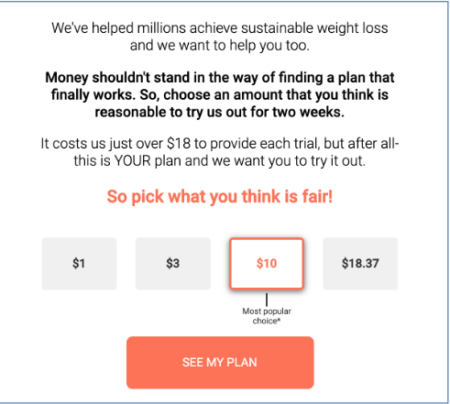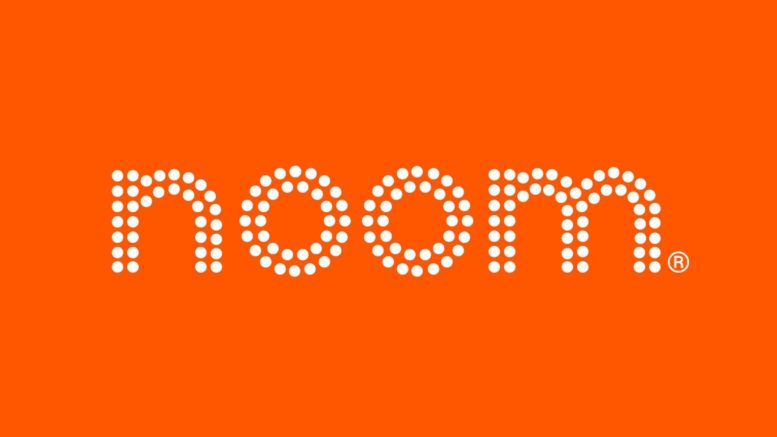Noom, the highly successful weight reduction company, has lost its attempt to dismiss a $100 million lawsuit about fraudulent practices dismissed.
U.S. District Judge Lorna Schofield of New York, has denied Noom’s multiple requests for dismissal, allowing for a trial, or more likely a settlement.
The issues involve Noom’s so-called free trial program, which the suit says sucks people into long-term commitments which are then difficult to cancel, as well as Noom’s false claims that it provides personally-tailored weight-loss plans.
“Noom uses its renewal scheme to lure customers with deceptive promises of “low cost” or “zero cost” trial periods that turn out to be extraordinarily difficult to cancel and instead result in customers being trapped in costly auto-recurring plans they never had any intention of enrolling into,” says the suit filed in May 2020.
“Further, instead of monthly fees, Noom imposes lump-sum charges for its entire program, extracting up to six months of non-refundable advance payments on the very first day of a customer’s enrollment.
“As Noom’s COO and CFO Adam Fawer blithely acknowledges,’If someone is only staying one month, we’re not making a whole lot of money off that person.’”
With over 50 million downloads of its weight-loss app, Noom is one of the fastest-growing weight-loss programs in the world and has almost quadrupled its annual revenue to over $237 million in the past year.
A similar lawsuit was also filed in New York this past May. Both suits request to be declared class-actions, which would let them represent all customers who felt they had been cheated.
As a note of interest, minutes after posting this column I received an ad from Noom on my Facebook feed. That is the first ad I had ever received from Noom.
How Noom’s Introductory Program Works
Defendant’s automatic renewal program works as follows. In exchange for customers’ credit/debit card or PayPal account information, Noom gives customers the opportunity to “try” its weight loss “coaching” program for a purportedly “risk free” two-week trial period that is either free or at a set low cost ranging from $1.00 to $18.37.
After capturing its customers’ payment information, as soon as the trial period ends the Company activates its auto-renewal program and begins assessing non-refundable membership fees. The fees start with a lump-sum
non-refundable advance payment for as many as six months at a time, at a cost as high as $199.
In short, Noom actively misrepresents and/or fails to accurately disclose the true characteristics of its trial period, its automatic enrollment policy, and the actual steps customers need to follow in attempting to cancel a 14-day trial and avoid automatic enrollment.
While Noom holds out the trial as a “risk-free” option costing customers either nothing or less than $20, the
Company knows that in fact many unwitting customers are likely to be charged as much as $199 after signing up for the 14-day trial.

False Promises Of Tailored Weight-loss Plans
Noom also deceives customers by making false promises concerning the service itself—in particular, its claim
that customers will receive a “customized,” “personalized,” “tailored” plan, and will receive
support from Noom’s “dedicated coaching team.”
In reality, customers like Plaintiff Geraldine Mahood receive only impersonal, automated messages powered by artificial intelligence which can only be accessed through Noom’s smartphone app. Thus, like Ms. Mahood, many customers do not even understand that they have been assigned a “coach” or know who their “coach” is.
All communication between customers and Noom is through a smart phone app.
The app allows users to log their meals and their regular “weigh-ins,” and access articles and motivational tips for reaching their diet and exercise goals.
Through the app, users are also able to send messages to an artificial intelligence-powered “bot.”
This bot is designated with a name and a picture icon of a person, but it is not a reachable human and only interacts with users through impersonal, automated statements.
The bot provides superficial answers to users’ questions, and sometimes does not respond to questions at all. This automated messaging system is the so-called “coach” that Noom refers to when it tells its customers to cancel by “simply
let[ting] your coach know.”
In reality, rather than fulfilling its promise to connect all customers with dedicated human coaches, Noom utilizes the artificial intelligence technology that it used in its original free fitness tracker to deceive consumers into believing that the messages and tips they receive on the Noom smartphone app are exclusively coming from a human coach.
Noom Put On Notice By Better Business Bureau Complaints
In continuing to carry out its fraudulent billing and marketing tactics, Defendant has ignored glaring red flags demonstrating that its billing and advertising is deceitful, including abnormally high complaint rates.
Through the Better Business Bureau, Noom has received more than sixteen hundred complaints from customers complaining about being billed without their authorization. Moreover, the Company still has a “D” rating from the BBB due to the fact that it “has failed to resolve underlying cause(s) of a pattern of complaints.”
The BBB cautions consumers as follows:
Many consumers reportedly try to cancel the trial offer before it ends but still end up being billed for the subscription. A number of these consumers say they were told at sign-up that after the free trial the cost of monthly membership was around $20.They also claim that after the free trial ends, they are charged upfront for 6 months subscription (approximately $120-$150) instead of being billed monthly. Nearly all consumers detail the difficulty they encounter when trying to get in contact with the company’s customer service to request a refund of charges.
Hundreds more similar complaints on websites such as BirdEye.com12 and RevDex.com13, as well as reviews for Noom’s app on the Google Play Store14 have put Noom on further notice that its customers are unwillingly being charged far more than the $0.00 to $18.37 that they agreed to pay for a 14-day trial.


